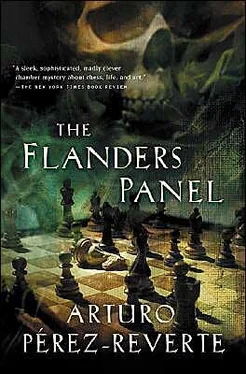“There’s something that doesn’t make sense,” Munoz said suddenly, and Julia turned to him, surprised. He was staring at Cesar with his head on one side, an inquisitive light shining in his eyes; it was the way he looked when he was concentrating on the chessboard, tracking a move that didn’t quite satisfy him. “You’re a brilliant chess player; on that we agree. Or, rather, you have the ability to be one. Nevertheless, I don’t believe you have the ability to play this game the way you did. The combinations were too perfect, inconceivable for someone who hasn’t been near a chessboard in thirty-five years. In chess, what counts is practice and experience. That’s why I’m sure you’ve been lying to us. Either you’ve played a lot during these years, alone, or someone helped you. I hate to wound your vanity, Cesar, but I’m sure you had an accomplice.”
A long dense silence followed these words. Julia was looking at them both, disconcerted, unable to believe what Munoz had said. But just when she was about to shout that it was all utter nonsense, she saw that Cesar, whose face had frozen into an impenetrable mask, had finally arched one ironic eyebrow. The smile that then appeared was a grimace of recognition and admiration. He sighed deeply, crossed his arms and nodded.
“My friend,” he said slowly, dragging out the words, “you deserve to be something more than an obscure weekend chess player in a local club.” He threw out his right hand as if to indicate the presence of someone who’d been there with them all the time, in a shadowy corner of the room. “I do, in fact, have an accomplice, although in this case he can consider himself quite safe from any reprisals on the part of Justice. Would you like to know his name?”
“I was hoping you’d tell me.”
“Of course I will, since I don’t believe my betrayal will harm him much.” He smiled, more broadly. “I hope you won’t feel offended, my esteemed friend, that I kept this small source of satisfaction to myself. Believe me, it affords me great pleasure to know that you didn’t find out absolutely everything. Can’t you guess who he is?”
“I can’t, and I’m sure it’s no one I know.”
“You’re right. His name is Alfa PC-1212. He’s a personal computer with a complex chess programme with twenty levels of play. I bought it the day after killing Alvaro.”
For only the second time since she’d known him, Julia saw a look of amazement on Munoz’s face. The light in his eyes had gone out and his mouth hung open in astonishment.
“Haven’t you got anything to say?” asked Cesar, observing him with amused curiosity.
Munoz gave him a long look but didn’t answer. After a while, he looked across at Julia.
“Give me a cigarette, will you,” he said in a dull voice.
She offered him the pack, and he turned it around in his fingers before taking out a cigarette and putting it to his lips. Julia proffered a lit match, and he inhaled the smoke slowly, deeply, filling his lungs. He seemed to be a million miles from there.
“It’s hard to take, isn’t it?” said Cesar, laughing softly. “All this time you’ve been playing against a simple computer, a machine with no emotions or feelings. I’m sure you’ll agree with me that it’s a delicious paradox, a perfect symbol of the times we live in. Maelzel’s prodigious player had a man hidden inside, according to Poe. Do you remember? But times change, my friend. Now it’s the automaton that hides inside the man.” He held up the yellowing ivory queen he had in his hand and showed it, mockingly. “And all your talent, imagination and extraordinary capacity for mathematical analysis, dear Senor Munoz, have their equivalent on a simple plastic diskette that fits in the palm of a hand, like the ironic reflection in a mirror that shows us only a caricature of what we are. I’m very much afraid that, like Julia, you will never be the same after this. Although in your case,” he acknowledged with a reflective smile, “I doubt if you will gain much from the change.”
Munoz still said nothing. He merely stood with his hands in his raincoat pockets again, the cigarette hanging from his lips, his inexpressive eyes half closed against the smoke. He looked like a parody of a shabby detective in a black-and-white movie.
“I’m sorry,” said Cesar, and he seemed sincere. He returned the queen to the board with the air of someone about to draw a pleasant evening to a close and looked at Julia.
“To finish,” he said, “I’m going to show you something.”
He went over to a mahogany escritoire, opened one of its drawers and took out a fat sealed envelope and the three porcelain figurines by Bustelli.
“You win the prize, Princess.” He smiled at her with a glint of mischief in his eyes. “Once again you’ve managed to find the buried treasure. Now you can do with it what you like.”
Julia regarded the figurines and the envelope suspiciously.
“I don’t understand.”
“You will in a minute. During these last few weeks I’ve also had time to concern myself with your interests. At this moment, The Game of Chess is in the best possible place: a safe-deposit box in a Swiss bank, rented by a limited company that exists only on paper and has its headquarters in Panama. Swiss lawyers and bankers are rather boring people but very proper, and they ask no questions as long as you respect the laws of their country and pay their fees.” He placed the envelope on the table, near Julia. “You own seventy-five per cent of the shares in that limited company, the deeds of which are in the envelope. Demetrius Ziegler, a Swiss lawyer and an old friend you’ve heard me mention before, has been in charge of this. No one, apart from us and a third person, of whom we will speak later, knows that for some time the Pieter Van Huys painting will remain where it is, out of sight in that safe-deposit box. Meanwhile, the story of The Game of Chess will have become a major event in the art world. The media and specialist magazines will exploit the scandal for all it’s worth. We foresee, at a rough estimate, a value on the international market of several million… dollars, of course.”
Julia looked at the envelope and then at Cesar, perplexed and incredulous.
“It doesn’t matter what value it reaches,” she murmured, pronouncing the words with some difficulty. “You can’t sell a stolen painting, not even abroad.”
“That depends to whom and how,” replied Cesar. “When everything’s ready – let’s say in a few months – the painting will come out of its hiding place in order to appear, not at public auction, but on the black market for works of art. It will end up hanging, in secret, in the luxurious mansion of one of the many millionaire collectors in Brazil, Greece or Japan, who hurl themselves like sharks on such valuable works, either in order to resell them or to satisfy private passions to do with luxury, power and beauty. It’s also a good long-term investment, since in certain countries there’s a twenty-year amnesty on stolen works of art. And you’re still so deliciously young. Isn’t that marvellous? Anyway, you won’t have to worry about that. What matters now is that, in the next few months, while the Van Huys embarks on its secret journey, the bank account of your brand-new Panamanian company, opened two days ago in another worthy Zurich bank, will be richer to the tune of some millions of dollars. You won’t have to do anything, because someone will have taken care of all those worrying transactions for you. I’ve made quite sure of that, Princess, especially as regards the vital loyalty of that person. A loyal mercenary, it must be said. But as good as any other; perhaps even better. Never trust disinterested loyalties.”
Читать дальше












